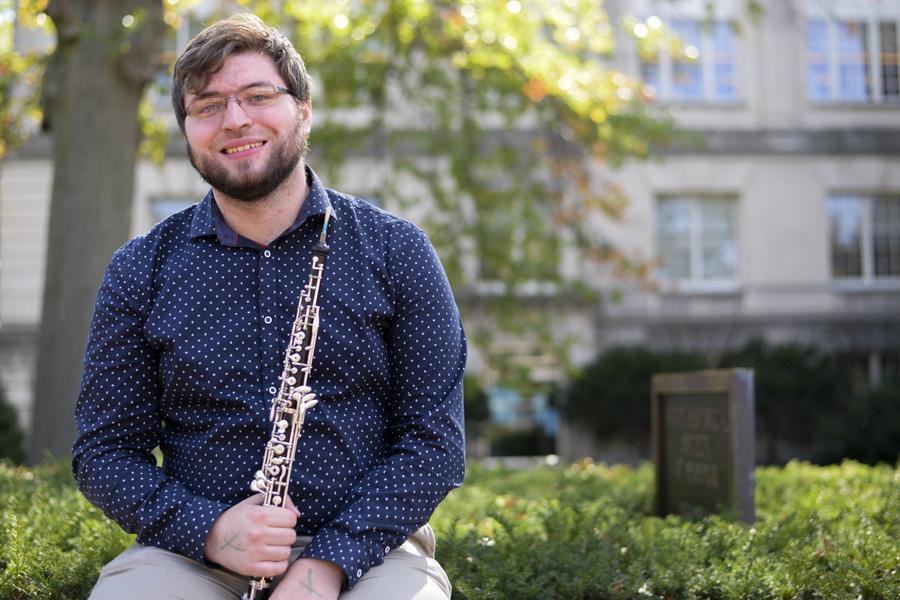
A string tremolo starts the composition, followed by a solo on the piano. The violin gets its shining moment before a jump in tune played primarily on the oboe. For six and a half minutes, the cello, clarinet, flute, marimba, oboe, piano and violin give listeners the experience of what junior Trey Makler titled “Elysium.”
“I wanted listeners to just be there and not be concerned about where the music is going,” Makler said. “‘Elysium’ has this lush quality about it. I wanted it to feel like you were inside this sound world.”
The inspiration for Makler’s original piece came mostly from one image among 150 given by the Forest Park Forever Foundation. The composition accompanied a slideshow of images that showcased the work done by the foundation at an event for its donors.
Needing to submit a single piece of work for the Sinquefield Composition Prize that best represented himself as a composer, Makler chose “Elysium.” The piece won first prize, the highest honor for a composition student at MU.
Makler’s winning entry in the competition took him two months to compose with insights from faculty and friends.
“I would write a chunk of the piece, take it to a composition class and ask the professor to look it over,” Makler said. “After I finished writing it, I printed off copies of the score and gave it to my friends and asked them to circle everything that did not look good.”
He wanted his score for Elysium to “look beautiful.”
Eric Honour, professor of music at the University of Central Missouri and one of three judges of the competition, said “Elysium” is “a beautiful piece of music.”
“(Makler) uses very simple materials, but employs them elegantly,” Honour said. “His attention to details of timbre and texture creates some gorgeous moments in the work.”
Of the four compositions evaluated, “Elysium” made the biggest impression on Nicholas Omiccioli, a composer and a judge of the competition. He said elements of the piece — like the pacing and use of color — showed qualities of a master composer.
In music, color, often associated with timbre, is what makes a particular musical sound different from another, even when they have the same pitch and loudness.
Makler describes it a little differently.
“Timbre directly relates to how an instrument sounds, which is part of color, and color is more of an orchestrational idea,” he said.
“Elysium” is Makler’s first composition to focus on color and harmony, a new experience for him. He said he plans to explore orchestral color further and use it in his commission from MU’s University Philharmonic Orchestra, which will receive its world premiere in April 2015 at the annual Chancellor’s Concert.
The commission is part of his prize from the competition, which also includes a cash award and the opportunity to have his work recorded.
Even though Makler has been composing since seventh grade, he kept his compositions mostly to himself. In his junior and senior years of high school, he composed a piece, called “Psalm 55,” for his choir and showed it to his choir director, Sue Bauche, wondering if it would be performed.
“Psalm 55” was performed at a spring concert during Makler’s senior year of high school in Farmington, Missouri.
While most of his compositions were kept private, Makler played the oboe in band all through middle and high school, starting in seventh grade.
“I had to work really hard to play the oboe well,” he said. “I hated it for a while. But when you’re bad at something and you’re stuck doing it, you don’t want to continue being bad at it.”
So he practiced and practiced and practiced.
Nine years later, he juggles composing and playing the oboe. He said his biggest fear is compromising and not giving enough time to composition.
But because he plays the oboe, he said he understands what it takes to be a performer playing music composed by somebody else. Makler said he believes this will make him a better composer.
For now, however, Makler is going to start by taking his composition more seriously.